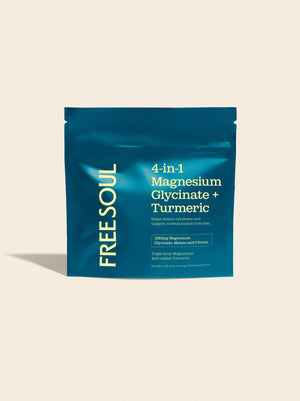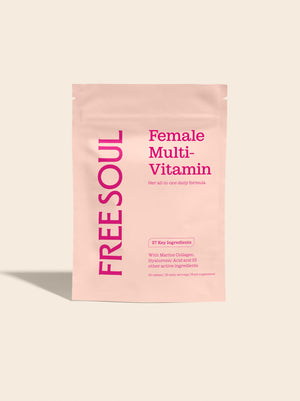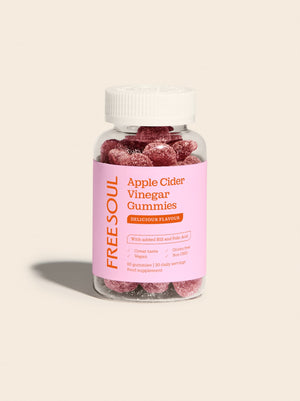Reviewed by: Natalie Rouse, Registered Nutritionist
Sometimes everything just feels a bit… off. Maybe you’re tired, irritable, or all the emotions are bubbling close to the surface. When there’s a clear reason – like you worked 70 hours this week – it’s not such a mystery. Other times, you might wonder where it’s coming from.
Stress is a common culprit; juggling a hundred different things at work and home can manifest itself physically and emotionally. But other times, it's not the external factors at play, but the internal. We asked Natalie Rouse, Registered Nutritionist and Head of Nutrition at Free Soul, to talk to us about the difference between stress and hormone imbalance, and what to do if it is your hormones disrupting your inner balance.
As Natalie puts it, “The signs of hormonal imbalance can sometimes be confused with stress, and vice versa. Understanding the underlying cause of your symptoms is the first step in taking action to help yourself.”
Busy vs Burnout – What's the difference?
First, let’s talk about how to tell whether it's everyday busyness getting you down or if you’ve reached burnout.
Busy symptoms:
- Occasional tiredness
- Periods of feeling overwhelmed
- Stress with an obvious cause
- You bounce back after some rest
- You can still enjoy things
Burnt out symptoms:
- Constant fatigue
- Persistent brain fog and/or emotionally drained
- Stress without an obvious cause
- No amount of rest helps
- Feeling disconnected and struggling to enjoy anything
“The key difference is that regular stress tends to be temporary and manageable, whereas burnout is a more permanent state caused by prolonged stress, leading to emotional and physical symptoms. When your body reaches the burnout stage, it can also have an impact on your hormones. The link between stress and hormones is well-studied and when an imbalance occurs, you may feel it in your emotions and body,” says Natalie.
What are hormones?
Hormones are chemical messengers that regulate your bodily functions. They influence your mood, metabolism, sleep cycle, menstrual health, and many other things. Here are a few of the main players:
- Cortisol – commonly known as the “stress hormone”, plays an important role in your body’s stress response cycle.
- Oestrogen – plays an important role in your menstrual and sexual health, including regulating your cycle and reproductive function.
- Progesterone – often referred to as the “calming hormone”, it works with oestrogen to regulate your cycle and support relaxation
- Insulin – moves glucose around your body, contributing to blood sugar levels and energy metabolism.
- Melatonin – aka, the “sleep hormone”, helps regulate your sleep-wake cycle.
“Hormones don’t work in isolation, they’re part of a complex system,” says Natalie. “When there’s an imbalance in one, it can disrupt the whole network. It’s the body’s way of signaling it needs a bit more care and attention.”
How stress affects your hormones
If you’re handling stress long-term, your cortisol levels will be elevated for a prolonged period. “An abundance of cortisol in your body long-term can begin to impact other hormones, such as oestrogen and progesterone,” Natalie explains. “This can potentially throw off the delicate balance in your body, showing up in changes in mood, menstrual cycle, or sleep patterns, because other hormones are sensitive to your body’s stress response.”
5 signs of hormonal imbalance
It’s not always easy to know when hormone balance is causing disruption in your body, but Natalie highlights a few telltale hormonal imbalance symptoms to watch for:
1. Lower energy levels
We’re talking about the kind of tiredness that doesn’t improve, no matter how much rest you get. Cortisol imbalance can be the culprit for constant fatigue. It’s an important hormone that naturally fluctuates during the day – rising to wake you up, dropping to help you wind down at night – but long-term stress can disrupt this rhythm, so your energy levels may not bounce back like they should
2. Sleep disturbances
When you’re having trouble falling asleep or you find yourself waking up in the middle of the night, there could be a few hormones at play. A disruption in melatonin levels can disrupt the natural rhythm of your sleep-wake cycle, while high cortisol levels may prevent your body from winding down naturally in the evenings.
3. Mood swings or heightened emotions
If your moods feel like a rollercoaster you can’t get off, it could be due to fluctuations in oestrogen, progesterone, or cortisol. Unexplained anxiety, irritability, or feeling low without a clear reason could be a sign that these hormones are out of balance, rather than caused by an obvious external factor.
4. Irregular menstrual cycle
There can be many reasons for irregular menstrual cycles, but oestrogen and progesterone play an important role. If periods become unpredictable, longer or shorter, with a lighter or heavier flow, it may be because one of these hormones is out of balance.
5. Skin or digestion changes
The state of your hormonal balance can often be reflected in your gut and skin health. Some women find that skin problems like breakouts or digestive discomfort and bloating occur during times of hormonal shifts. Oestrogen, insulin, and cortisol can be an influencing factor in these areas, and when levels aren’t what they should be, the evidence can show up physically.
What to do if you think you have a hormonal imbalance
If you suspect you may be going through hormonal imbalance, don’t panic. Hormonal shifts are a normal part of life, especially for women. Listen to your body, track symptoms like moods, sleep, and menstrual cycle to see if there are any patterns.
If your symptoms are worrying you or impacting your daily life, a healthcare professional can offer guidance on what may be wrong. There are also some easy ways to help yourself find balance again.
How to naturally restore hormonal balance
Natalie offers some simple approaches that you can take to ease your body back to hormonal balance – “These aren’t quick fixes, but small, consistent habits can support your body in regaining its natural balance over time.”
Balanced diet
Include protein with every meal to help maintain steady energy levels. Focus on fibre-rich fruits, leafy greens, whole grains and healthy fats like avocados to help support your body’s natural rhythm.
Exercise
Low to moderate intensity exercise can help hormone health in your body – think walking, strength work, and yoga. Try not to overdo it, as high intensity exercise can cause a further increase in cortisol levels.
Sleep routine
Creating a healthy bedtime routine can help your body regulate its sleep-wake cycle. Try to go to bed at the same time every night, limit screen time in the evenings, take supportive supplements, and try relaxation aids like reading or listening to calming music to help yourself wind down for sleep.
Stress management
Managing stress isn’t always easy, but a few lifestyle changes can make a big difference. That might be spending more time in nature, daily meditation, or simple breathing exercises can all help support lower stress levels.
Supportive supplements
Certain supplements can support your body in maintaining its natural hormonal balance, particularly when paired with good nutrition and rest. Magnesium, for example, is necessary for the enzymes responsible for hormone production. It also helps regulate the HPA axis, your body’s stress response system.
Vitamin D is another important nutrient in hormone health, with research suggesting it may be linked to oestrogen and progesterone levels across the menstrual cycle, as well as insulin production and resistance. While supplements don’t replace a balanced diet, nor are they a magic fix, they can offer additional support in maintaining inner harmony.
FAQs about hormonal imbalance
What are the most common hormonal imbalance symptoms?
Low energy, mood swings, sleep disruption, irregular menstrual cycles, and skin or digestive changes are all common symptoms of hormonal imbalance.
Can hormonal imbalance correct itself naturally?
Sometimes, yes. Hormonal shifts can be temporary and may rebalance naturally without intervention. However, giving your body the support it needs, through diet, rest, and stress management, is the best way to help your body find its natural equilibrium again.
Is burnout always related to hormones?
Not always. Burnout is usually linked to chronic stress, but cortisol plays a significant role in how you experience it. Taking care of your overall wellbeing can help your body handle stress over time.
Which vitamin is best for hormonal imbalance?
While there is not one “best” vitamin for hormonal balance, the B vitamin complex, vitamin D, and Magnesium all play a role in hormone balance.








